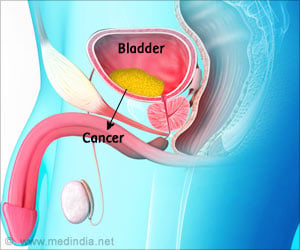Highlights
- Urothelial bladder cancer (UBC) is characterized by a high risk of recurrence.
- The standard test called cytology is different from a biopsy as it helps examine individual cells, rather than pieces of tissue containing many cell clusters.
- A new test identifies a protein, Telomerase reverse transcriptase (TERT) which indicates bladder cancer recurrence.
TERT is a faulty protein that may be present in the urine after initial surgery for bladder cancer. It indicates the presence of residual carcinoma.
The new test detected bladder cancers that had not spread to the muscle wall, earlier than cytology, potentially helping doctors to start treatment sooner and before symptoms appear. A further benefit is that the new test distinguished cancer from urinary tract infections. The test doesn't react to urinary tract infections, reducing the chances of misleading results.
Professor Alain Ruffion, a researcher based at the University Hospital of Lyon's Oncology Institute said: "The standard cytology test needs a doctor to look down a microscope to read the results, but the TERT test is read by a machine which is simpler, more accurate and available to use straightaway. While the TERT test costs slightly more than standard cytology, it is likely to become cheaper over time."
The discovery also suggests that further research is needed to understand more about the role TERT faults play in bladder cancer.
Bladder cancer occurs when there is abnormal cell growth in the urinary bladder. About 90-95% of the cancers begin from the inner lining of the bladder (urothelium or transitional epithelium) and hence they are known as urothelial or transitional cell carcinoma.
- Bladder cancer mostly occurs in people older than 55.
- Bladder cancer accounts for about 5% of all new cancers in the US.
- It is the fourth most common cancer in men, but it is less common in women.
- According to the American Cancer Society, there were about 79,030 new bladder cancer cases in the United States and around 16,870 deaths due to the same in 2017.
- A person with bladder cancer has a five-year survival rate as high as 77% as per the National Cancer Institute of United States. The lowest five-year survival rate of 15% was seen in patients affected by stage 4 (advanced) bladder cancer.
- Hematuria or blood in the urine is often the first warning of bladder cancer. But in most cases, this is invisible to the naked eye and can be detected only through a laboratory urine analysis.
Source-Medindia














